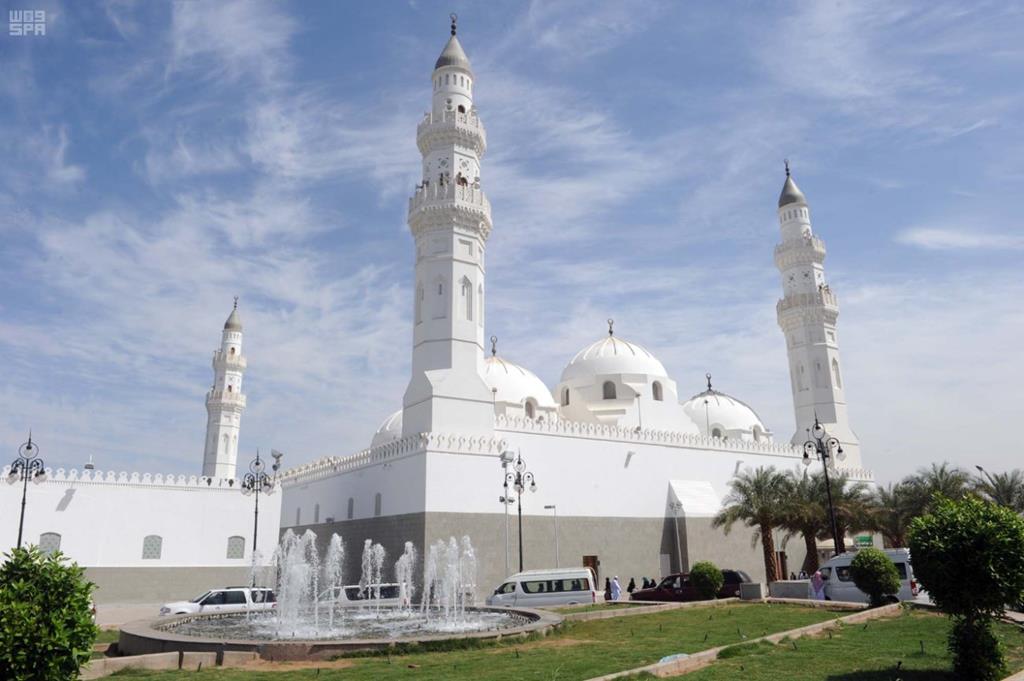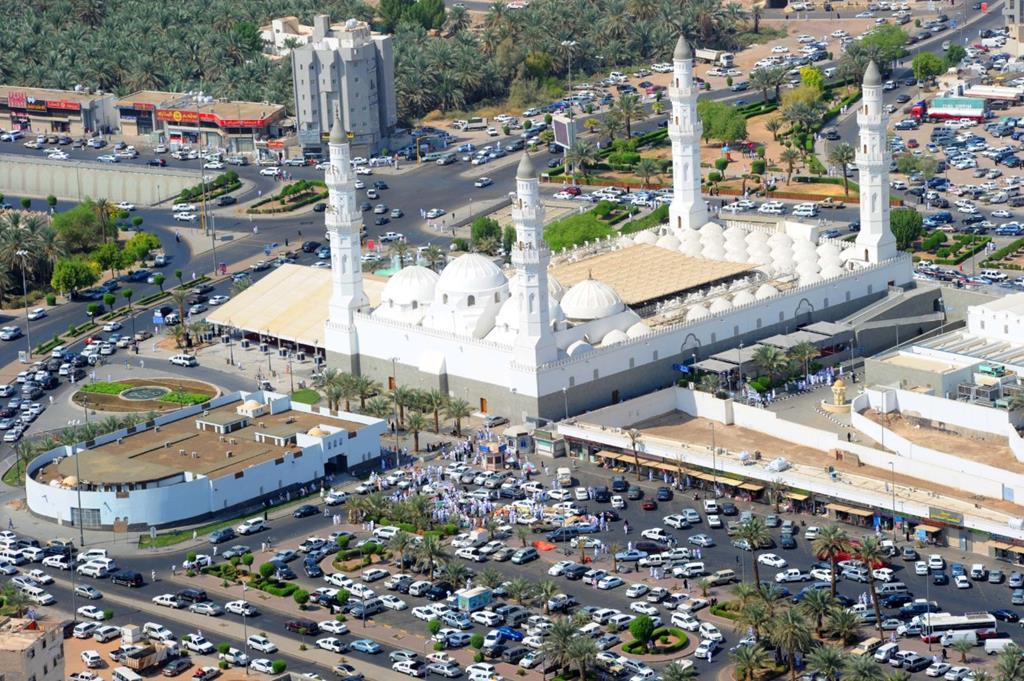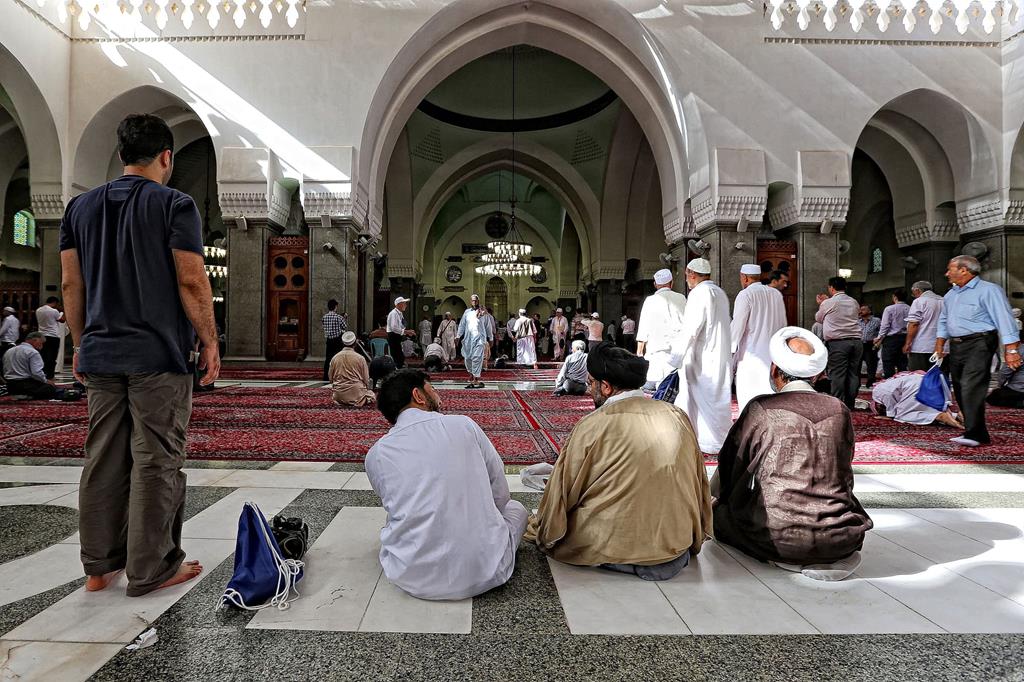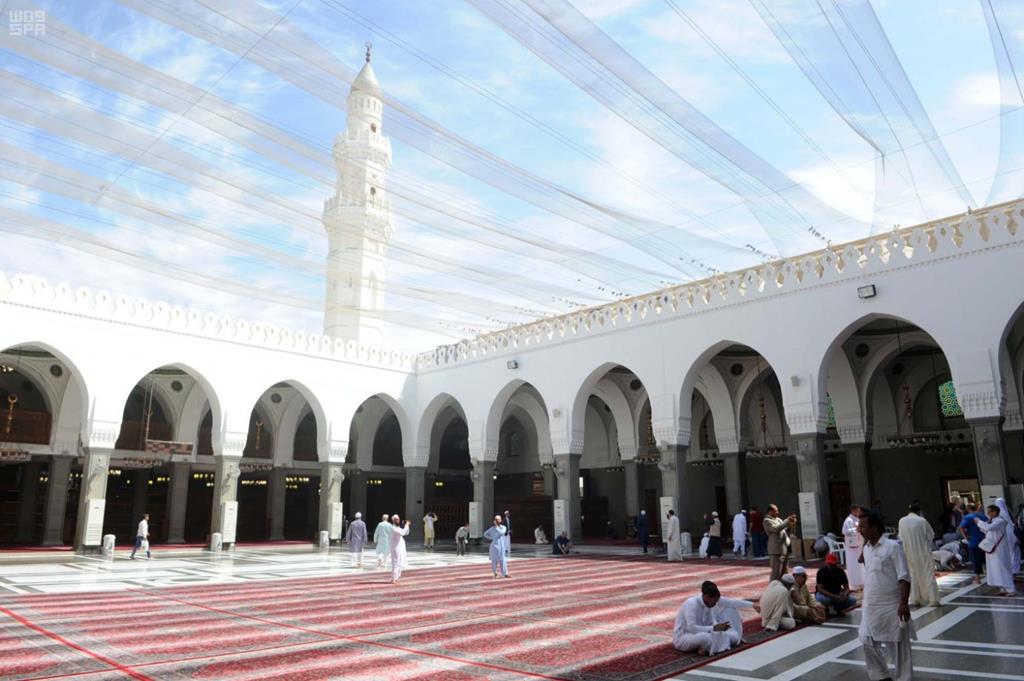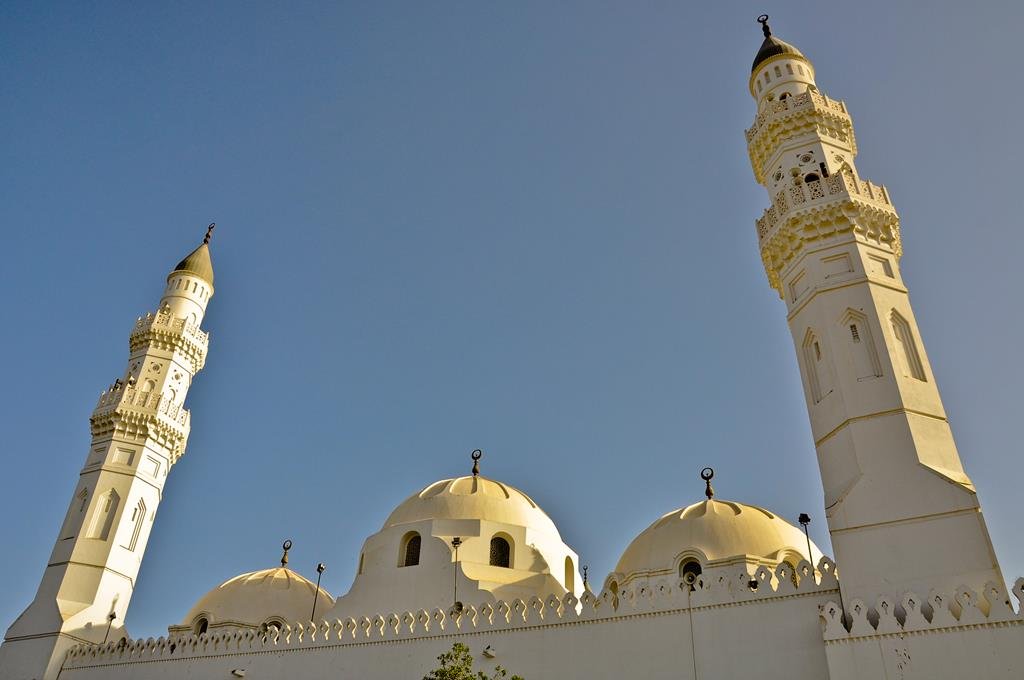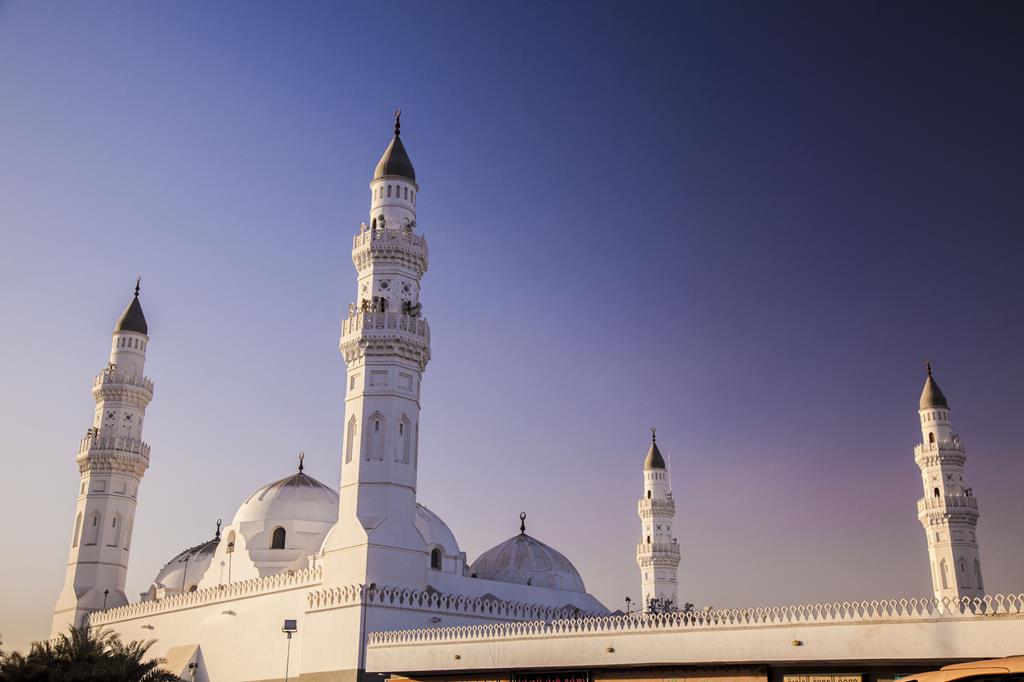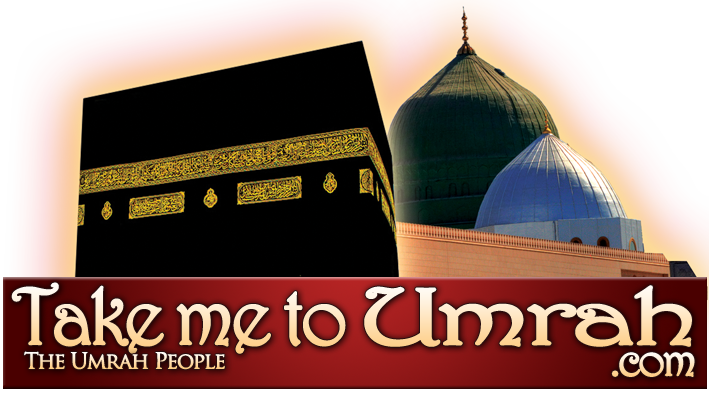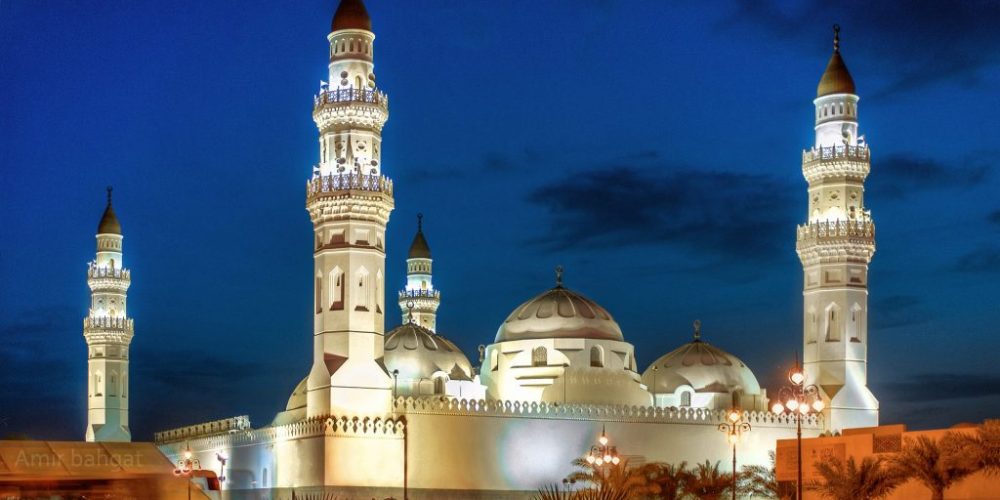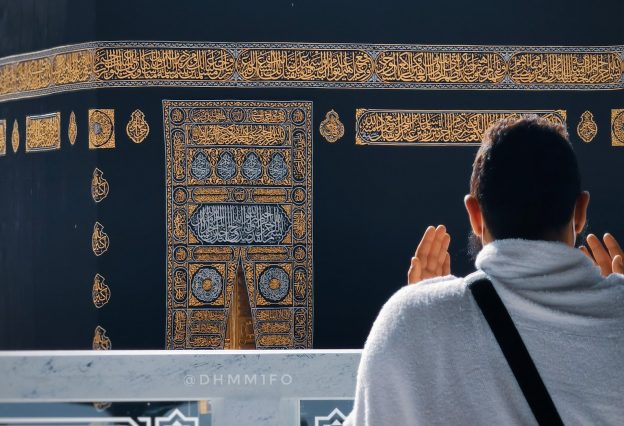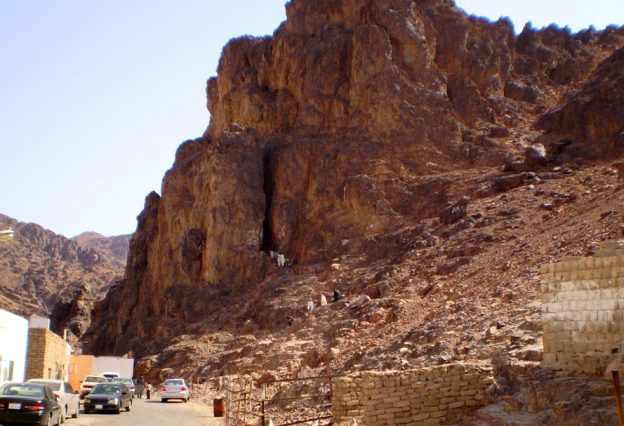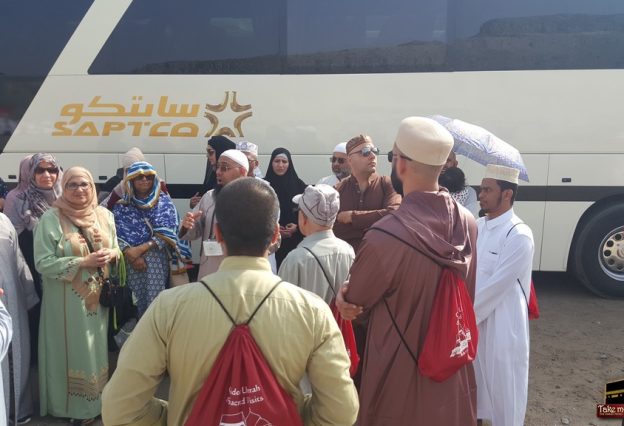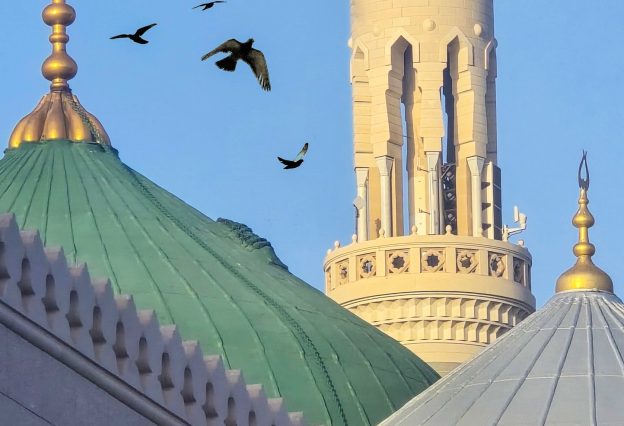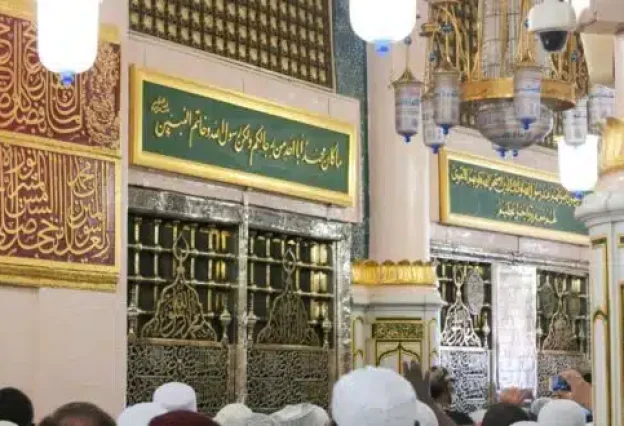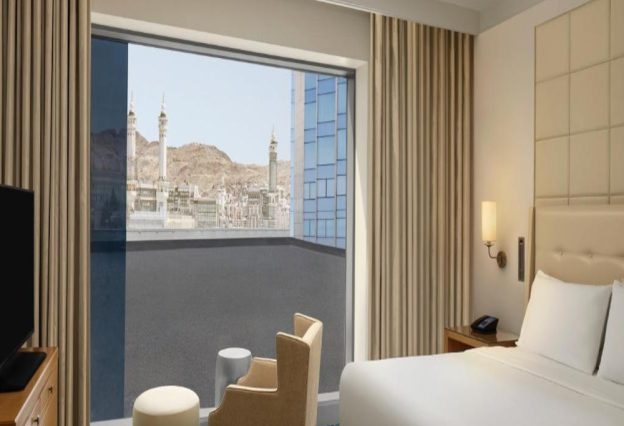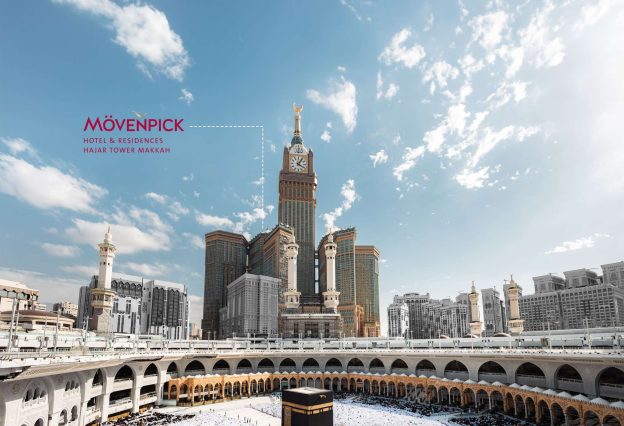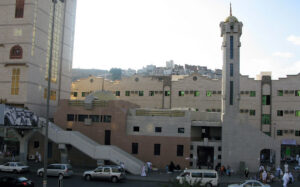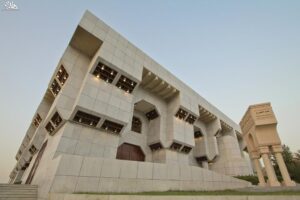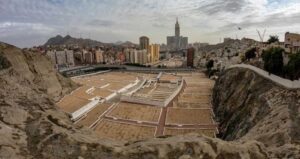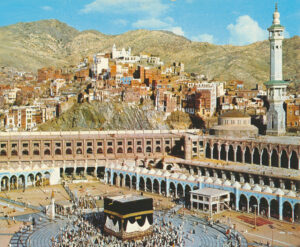Masjid Quba (Arabic: مسجد قباء) was the first mosque to be built by the Prophet ﷺ after his arrival in Madinah from Makkah. It is situated approximately 3.25 kilometres from Masjid Nabawi. For those who arrive in Madinah before or after performing Hajj or Umrah, a visit to Masjid Quba carries profound significance and promises great spiritual reward. This visit serves as a means of connecting with the memories of the Prophet’s ﷺ blessed Hijrah (migration) and his relentless efforts to spread the message of Islam. Furthermore, as stated by the Prophet ﷺ, praying in the mosque gives the same reward as performing Umrah.
Virtues of Masjid Quba
The first mosque
Masjid Quba holds the distinction of being the very first mosque in the history of Islam. Before the construction of Masjid Nabawi in Madinah, Masjid Quba served as the primary place of worship for Muslims.
Reward equivalent to Umrah
The Prophet ﷺ maintained a special connection with Masjid Quba. He made it a practice to visit the mosque every Saturday, either on foot or by camel, to offer two rak’ahs of salah.
He emphasized the spiritual significance of this act by saying:
Whoever purifies himself in his house and then comes to the Mosque of Quba and prays two rak’ahs will have the reward equivalent to performing the minor pilgrimage (Umrah).1
In another narration, he said:
Whoever performs ablution properly and then comes to Masjid Quba with no other intention but to pray four units, reciting Surah al-Fatiha in each unit, will receive the reward of a person who comes to the House of Allah to perform Umrah.2.
Anas bin Malik I, who had served the Prophet as a young man, visited Quba Mosque and performed two rak’ahs of prayer there. He then conveyed to the people of the village the excellence of this mosque, stating that even if he were a month’s journey away, it would have been worth the travel. He said:
Transcendent is Allah! How great is the merit of this mosque! Had I been a month’s journey away, it would have been worth the journey! He who leaves his house, heading for it, and prays four rak’ahs there, Allah sends him back with the reward of an Umrah.3
Love that the companions had for Masjid Quba
Sa’d ibn Abi Waqqas and Abu Huraira L, among other companions, held their visits to Masjid Quba very dear to their hearts. They even regarded it as more beloved than visiting Masjid al-Aqsa in Jerusalem. Sa’d remarked:
I prefer two units in Masjid Quba than to pray in Bait al-Muqaddas (Jerusalem) twice.4
Madinah’s renowned historian, ibn Shabba V, documented Umar ibn al-Khattab’s I veneration for Quba Mosque. Umar, the second Caliph of Islam, visited the mosque and personally cleaned its qibla wall with a green palm branch. His love for the mosque was so great that he declared:
I love to pray one salah in this mosque more than praying four times in Bait al-Muqaddas.
By Allah! Had I been in a remote region, I would have undertaken a camel journey to visit you.5
Mentioned in the Quran
The Quran mentions Quba mosque in Surah al-Tawbah, after a rival mosque was set up by the hypocrites nearby.
وَٱلَّذِينَ ٱتَّخَذُوا۟ مَسْجِدًۭا ضِرَارًۭا وَكُفْرًۭا وَتَفْرِيقًۢا بَيْنَ ٱلْمُؤْمِنِينَ وَإِرْصَادًۭا لِّمَنْ حَارَبَ ٱللَّهَ وَرَسُولَهُۥ مِن قَبْلُ ۚ وَلَيَحْلِفُنَّ إِنْ أَرَدْنَآ إِلَّا ٱلْحُسْنَىٰ ۖ وَٱللَّهُ يَشْهَدُ إِنَّهُمْ لَكَـٰذِبُونَ ❁ لَا تَقُمْ فِيهِ أَبَدًۭا ۚ لَّمَسْجِدٌ أُسِّسَ عَلَى ٱلتَّقْوَىٰ مِنْ أَوَّلِ يَوْمٍ أَحَقُّ أَن تَقُومَ فِيهِ ۚ فِيهِ رِجَالٌۭ يُحِبُّونَ أَن يَتَطَهَّرُوا۟ ۚ وَٱللَّهُ يُحِبُّ ٱلْمُطَّهِّرِينَ ❁
There are also those ˹hypocrites˺ who set up a mosque ˹only˺ to cause harm, promote disbelief, divide the believers, and as a base for those who had previously fought against Allah and His Messenger. They will definitely swear, “We intended nothing but good,” but Allah bears witness that they are surely liars. Do not ˹O Prophet˺ ever pray in it. Certainly, a mosque founded on righteousness from the first day is more worthy of your prayers. In it are men who love to be purified. And Allah loves those who purify themselves.
[Surah al-Tawbah, 9:107-108]
Verse 107 in Surah al-Tawbah refers to this rival mosque, which was constructed with malicious intent and aimed to create division among the believers. It is condemned in the Quran as an act of mischief and infidelity, ultimately seeking to undermine the unity of the believers. The following verse is believed by many scholars to be a reference to Masjid Quba.
History of Masjid Quba
The Prophet’s Migration ﷺ
Masjid Quba’s foundation is intrinsically linked to the Prophet Muhammad’s ﷺ migration (hijrah) from Makkah to Madinah in 622 AD. When he reached the vicinity of Madinah, he stopped at the place that would become Masjid Quba and spent 10 days amongst the Bani Amr ibn Auf clan, staying at the house of Kulthum ibn al-Hadm I. Thereafter, he initiated the construction of the mosque.
Construction
The Prophet ﷺ himself laid down some of the bricks, and his companions joined him in this noble task. Built with raw bricks and a roof of date palm leaves, the original structure was simple yet extremely important.
The construction of this sacred mosque was a labour of devotion, with the Prophet ﷺ personally participating alongside his companions. They toiled, carrying stones, rocks, and sand for the construction, with the Prophet ﷺ himself bearing the weight on his back. The companion al-Shimous bint al-Nuaman I recalled seeing dust on the Prophet’s ﷺ attire and even his stomach as he worked tirelessly. She said:
I observed the Prophet participating in the mosque’s construction. He would bear stones and rocks on his back until it bent. I saw dust on his clothes and his stomach. He refused help from his companions, insisting that they carry similar loads in his stead.6
The Prophet ﷺ led the inaugural group prayer at the Quba Mosque, with al-Aqsa Mosque in al-Quds (Jerusalem) serving as the Qibla at that time. Later, upon receiving a divine order through the angel Jibril S, the Qibla direction was changed to face Makkah.
Salim I, the freed slave of al-Hudhaifa I, would lead the prayer of the first Muhajireen (migrants) at Quba Mosque, including the esteemed figures of Abu Bakr al-Siddiq and Umar ibn al-Khattab L. The Prophet ﷺ spoke highly of Salim and entrusted him with the Quranic teachings, stating, “Take the Quran from four persons; Salim is one of them.”
Developments and Renovations
Over the centuries, Masjid Quba has seen multiple expansions and renovations. At different points in history, the Umayyads, Ottomans, and Saudis all contributed to the mosque’s present grandeur.
Initial Renovations
The third Muslim Caliph, Uthman ibn Affan I, played a role in renovating and expanding the mosque, as did Umar ibn Abdul Aziz I, the governor of Madinah during the Umayyad rule, in the years 91-93 AH (711-713 CE). Umar’s contributions included the construction of minarets and balconies, decorative mosaic work, and replacing the traditional tree branch and leaf roof with iron bars.
Continued Maintenance
In 435 AH (1045 CE), Abu Yala al-Hussaini took the initiative to further renovate the mosque. Jamaluddin al-Isfahani, the chief minister of Bani Zanki, rulers of Mosul, undertook renovation efforts in 555 AH (1162 CE) and later in 671 AH (1275 CE). Al-Nasir ibn Qalawun, the ruler of Egypt, contributed to the mosque’s upkeep in 733 AH (1335 CE). Thereafter, al-Ashraf Barsbay, another Egyptian ruler, renewed the mosque’s roof in 840 AH (1439 CE). In the year 877 AH (1475 CE), a significant event occurred when the mosque’s minaret collapsed. Sultan Qaitbay took the initiative to rebuild it, completing the task four years later.
Ottoman Era Renovations
During the Ottoman Empire’s reign, Masjid Quba underwent several renovations and rebuildings, each contributing to its stature. One of the notable periods of restoration occurred during the reign of Sultan Abdul Majeed.
Expansion Under King Fahd
During Saudi Arabian rule, Masjid Quba received considerable attention and modernisation. In 1405 AH (1984), King Fahd ordered a substantial expansion of the Quba Mosque to accommodate a growing number of worshippers. He issued orders for its reconstruction, accompanied by a significant expansion in its area. Emphasis was placed on preserving the mosque’s sites of historical significance.
The Binladin Group, managed by the sons of Muhammad Binladin, the contractor responsible for expanding Masjid Nabawi during King Abdul Aziz’s reign, was entrusted with this task. The expansion was completed in 1407 AH (1986), and King Fahd inaugurated the newly expanded mosque.
The mosque’s area, which had previously covered 1,225 square meters, was increased to an impressive 6,100 square meters. This has an open space of 4,000 square meters in front of the mosque. The expansion saw the addition of three more minarets, bringing the total to four, along with six domes. Additionally, living quarters for the imam, muazzin, and other mosque staff were added. Notably, the mosque’s Islamic architectural heritage was meticulously preserved during this expansion, which incurred a cost exceeding SR90 million.
The mosque originally enjoyed the picturesque surroundings of orchards and groves on its eastern and southern sides, although these were later cleared to facilitate this expansion.
Other Mosques Near Masjid Quba
Historically, near Masjid Quba, you could find the Mosque of the Girls of al-Najar. This mosque held historical significance as it is where the girls of the Prophet’s ﷺ maternal clansmen, the Bani Najar, welcomed him with the famous song “Tala’ al-Badru ‘alayna” when he arrived in Madinah.
Photo Gallery
